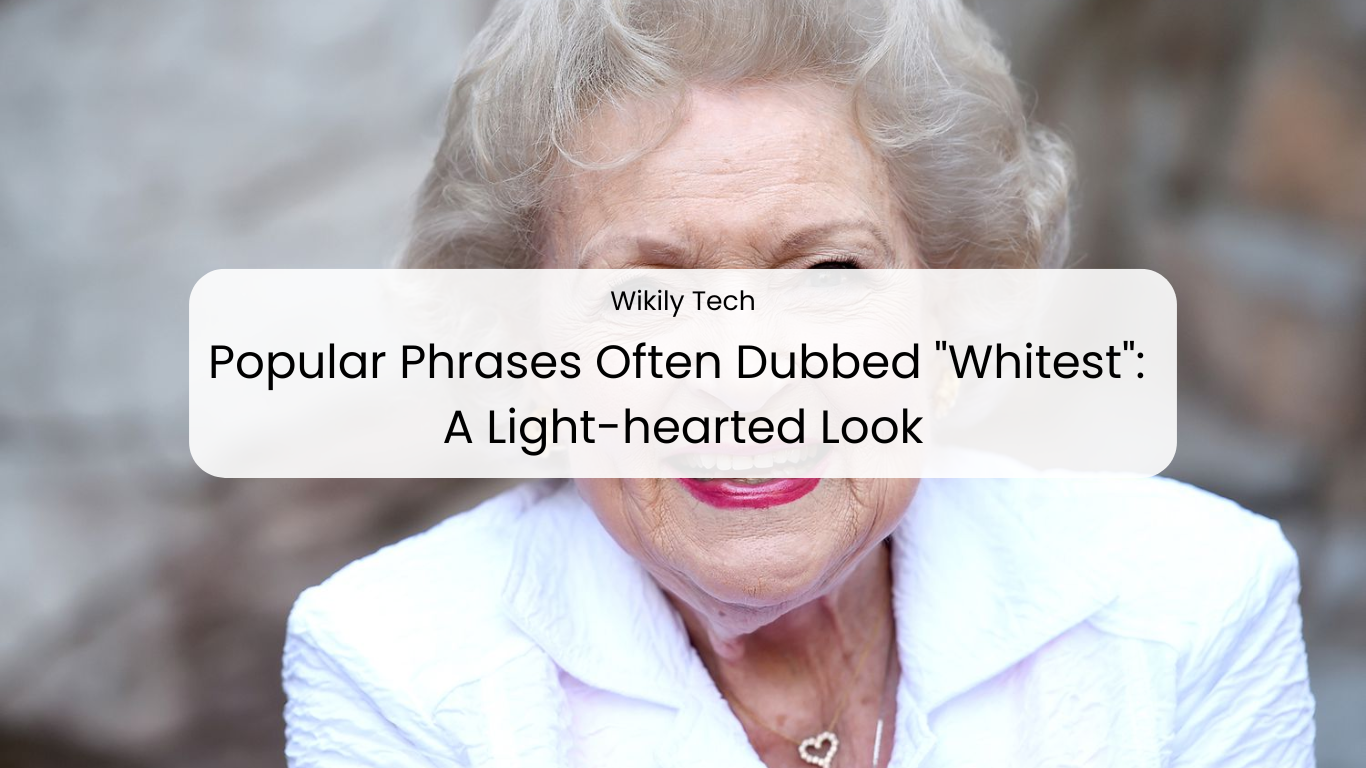The term “whitest phrases” is often used colloquially to describe expressions typically associated with White, often American, speakers. These phrases are identified through their frequent use in certain communities and can vary widely depending on social, regional, and cultural contexts.
This article explores some common phrases that might be categorized this way, while emphasizing that language evolves and is influenced by numerous factors.
Contents
Common Phrases Considered “Whitest”
Here are several expressions that are often labeled as “whitest”:
- “It is what it is.”
– This phrase signifies acceptance of the situation, implying that nothing can be done to change it.
- “I can’t even.”
– Often used to express overwhelming emotions or a situation that leaves someone speechless or frustrated.
- “Let’s touch base.”
– A business jargon term meaning to check in or update each other on a particular topic or project.
- “I did a thing.”
– This is a quirky way of announcing that the speaker has done something noteworthy, often shared with a hint of modesty or humor.
- “Can I speak to the manager?”
– Sometimes used to stereotype a demanding attitude in consumer settings, often implying entitlement.
- “Thanks, I got it on sale!”
A common response when complimented on an item of clothing or accessory, highlighting the good deal received.
- “That’s so funny!”
– Commonly said when someone finds something amusing, but notably used without actual laughter.
- “I’ll start my diet on Monday.”
– Typically mentioned in conversations about health or fitness, often implying a delay in starting healthy habits.
- “Live, laugh, love.”
– A cliché phrase commonly found on home decor items, signifying a positive life mantra.
- “We should start a podcast.”
– A modern phrase reflecting a trend where groups of friends consider starting their own podcast to discuss various topics.
- “Adulting is hard.”
– Used to describe the challenges of daily responsibilities that come with being an adult.
- “This is my jam!”
– Exclaimed when a favorite song plays, showing excitement and personal connection to the music.
- “Sorry, not sorry.”
– A way of apologizing without real remorse, often used in a playful or sarcastic manner.
- “I need a coffee before anything.”
– A common expression of dependency on coffee to start the day or undertake tasks.
- “Is there gluten in this?”
– Frequently asked concerning dietary preferences or restrictions related to gluten.
- “Let’s circle back.”
– Business jargon used to indicate that a topic will be revisited later in a meeting or discussion.
- “Brunch is my favorite meal.”
– Expresses a love for the late-morning meal that combines breakfast and lunch.
- “What’s the WiFi password?”
– A common question in homes, cafes, or any public place where people want to connect to the internet.
- “No worries, if not.”
– Often used at the end of a request to indicate that it’s okay if the request cannot be fulfilled.
- “I could use a vacation.”
– Typically said when someone is feeling overwhelmed or stressed and needs a break.
- “I’m not like other [gender].”
– Used to express that someone feels they are unique compared to the typical stereotypes of their gender.
- “It’s on my bucket list.”
– Refers to something someone wants to do before they die, emphasizing their life goals or dreams.
- “Just to play devil’s advocate…”
– A lead-in to a statement that typically presents an opposing viewpoint or a critical question.
- “Can I get a little bit of room for cream?”
– Often asked when ordering coffee, indicating the customer wants some space left in the cup to add cream.
- “Do you have any vegan options?”
– A question that reflects dietary preferences or restrictions related to veganism.
- “Let’s agree to disagree.”
– Used to end a discussion where both parties remain of different opinions but want to maintain a respectful relationship.
Cultural Context and Usage
The use of these phrases varies widely and can depend on factors like age, region, and social setting. They are often used in light-hearted, informal contexts and can be seen in social media, casual conversation, and across various forms of entertainment.
Why These Phrases Are Associated With Certain Demographics
Phrases become associated with particular demographics for many reasons, including media portrayal and regional speech patterns. The phrases listed are commonly heard in mainstream American media, often depicted in television and movies, which helps reinforce their association with White American speakers.
Conclusion
While the label “whitest phrases” is used colloquially, it’s important to approach such topics with an understanding of the fluid nature of language and cultural expression. Language serves as a bridge, not just a barrier, and embracing the diversity of how people communicate can lead to richer, more inclusive interactions.
